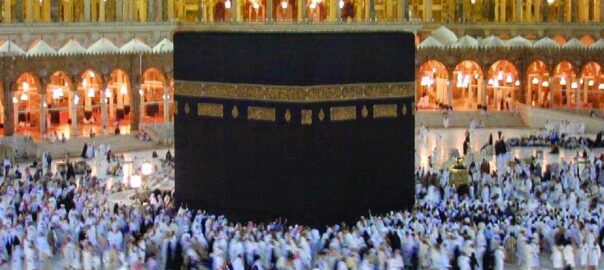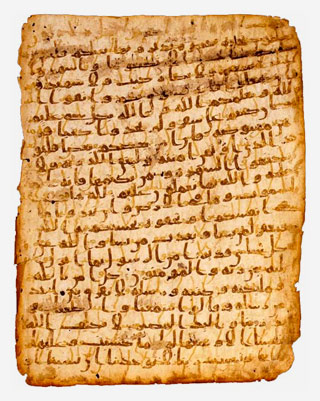
Muhammad: Origins of Islam:
A New Mindset
In addition to emphasizing a belief in one God and the importance of ethical behavior in all aspects of life, the new mindset promoted by Prophet Muhammad focused on personal responsibility and self-improvement, and on social justice and equality. He emphasized compassion, empathy and forgiveness and encouraged people to “Blossom Forth,” that is to strive to realize their full potential for positive change and for the benefit of others.
Last Updated 1 September 2025
Muhammad never thought nor claimed to be inventing a new religion. He never sought power nor took advantage of his situation or status:
“I am nothing but a warner and a herald of glad tidings unto people who will believe.” (Qur’an 7:188)
“There shall be no coercion in matters of faith.” (Qur’an 2:256),
and again,
“But if they turn away from thee, O Prophet, remember that thy only duty is a clear delivery of the message entrusted to thee.” (Qur’an 16:82)
From the second revelation until his death he maintained a singleness of purpose as a Messenger of God to convey and carry out His wishes. He was tasked to restore the original monotheistic faith of Adam, Abraham and other prophets whose messages had become misinterpreted or corrupted over time. His revelations confirmed that the God of the “People of the Book” was the one and only Allah, God of all humanity, and that people should honor Him and only Him in life and deed. The Qur’an (42:13) says: “[God] has established for you the same religion enjoined on Noah, on Abraham, on Moses, and on Jesus.”
From the second revelation until his death he maintained a singleness of purpose as a Messenger of God to convey and carry out His wishes.
As Reza Aslan notes in No god but God, The Origins, Evolution, and Future of Islam, it is not surprising that: “There are striking similarities between the Christian and Qur’anic description of the Apocalypse, the Last Judgment, and the paradise awaiting those who have been saved.” But he points out that “These similarities do not contradict the Muslim belief that the Qur’an was divinely revealed, but they do indicate that the Qur’anic vision of the Last Days may have been revealed to the pagan Arabs through a set of symbols and metaphors with which they were already familiar, thanks in some part to the wide spread of Christianity in the region.”

Just as the first followers of Jesus did not consider themselves members of a new religion, neither did the initial “believers” close to Muhammad. The group included former pagans, Jews and Christians: monotheists who saw themselves as people trying to live in accordance with God’s rules and law. According to Fred Donner in Muhammad and the Believers: “Muhammad built a movement of devout spiritualists from many faiths who shared a few core beliefs: God was one, the end of the world was near, and the truly religious had to live exemplary lives rather than merely pay lip service to God’s laws. It was almost a century after Muhammad founded his ‘community of believers’ and launched the great Islamic conquest that his followers started to define their beliefs as a distinct religious faith.”
Muhammad was a gentle and contemplative man, he had no real status within the Quraysh and was not of the stature that the Arab world would expect for a prophet. As Karen Armstrong and others have noted, he was not a violent man but faced a violent, barbaric, corrupt, greedy and contemptuous world that he understood would destroy itself unless it changed. “Muhammad literally sweated with the effort to bring peace to war-torn Arabia. He realized that Arabia was at a turning point and that the old way of thinking would no longer suffice, so he wore himself out in the creative effort to evolve an entirely new solution.”
“Muhammad built a movement of devout spiritualists from many faiths who shared a few core beliefs…”
Those close to Muhammad were the first to believe in his revelations. Ali, who was taken in by Muhammad when his father, Abu Talib, was in financial distress, was the first; then Zayd, who remained at his side, although he had been a Syrian slave until he was given his freedom by Muhammad; the merchant Abu Bakr was the third to join the believers. He had a reputation for kindness and honesty and once he joined Muhammad others who knew him did the same.
The Messenger’s immediate goal was to bring the message of Allah to his own tribe, and many of the revelations were extremely difficult for the Quraysh to adopt. Not only had they to reject all their idols but their conduct had to change entirely—they had to submit their own will to the will of Allah.
Muhammad’s Mindset
In his book Muhammad, the World-Changer, Jebara writes that with the advent of Qur’anic revelations Muhammad’s “confidence had returned” after a low period during which he was disillusioned by Meccan society and personal tragedies (the death of his son). Following the revelations, as predicted by his wife Khadija’s cousin Waraqa, Muhammad was persecuted and ridiculed, but he was able to counter that with a mindset that, Jebara writes, “combined …transcendent purpose, a distinctive positive attitude, and practical techniques for effective implementation.”
In his second book, The Life of the Qur’an, Jebara refers to “the DNA of the Quran”: the Arabic language itself and the letters that are its foundation. He points out that language is the only concrete basis for a shared understanding of the Qur’an. By tracing the words to their roots, scholars can provide translations that convey an appreciation of the original text as traditional Islamic scholars understood it. In this way he notes we can avoid interpreting through the lens of ideology and politics.
Using this strategy, Jebara produces translations that are often different, longer, and more explanatory than the usual ones available, but he requests his readers to keep an open mind. An example is in the use of the term “blossoming” to convey a central, key idea that is both practical and relevant to us today.
The very first word that most people agree was revealed to the Prophet was “Iqra,” which in modern times is translated as “Read” or “Recite.” Jebara notes that these are secondary connotations that would hardly be relevant to an illiterate as Muhammad is traditionally said to have been. He writes: “The key word Iqra that had taken three contractions to emerge literally meant ‘blossom forth’ or ‘be born’—a call to a new being to break out of the darkness of obscurity and emerge into the outside world…the term qara’a implies a healthy birth of something destined to survive. The ancient Arabs would say…Qara’at-il-Azhar (‘the flowers blossomed’). … Iqra issued a command to unfurl what was…within and finally share it with the world, allowing an inner truth to be revealed…like a bud finally daring to blossom and exposing itself to the elements.”
Moreover, the Qur’an derives its name from Iqra. Here is Jebara’s translation of the first revelation the Prophet received:
Blossom forth, inspired by your rejuvenating Divine Mentor, who revives the dormant to forge empowering connections. Dare to blossom, as your Divine Mentor provides spiritual comfort. The Visionary One, who guides the unlocking of layers of learning, elevates the stagnant to once-inconceivable heights.
According to Jebara the Qur’an teaches the art of blossoming.
Jebara continues to outline key features of these three aspects of this mindset, including the following (Jebara’s words are italicized):
Transcendent Purpose
The second revelation to the Prophet teaches that blossoming…is for a noble purpose that transcends personal advancement.
It enjoins us to:
Cast off the constellation of obstacles weighing you down!
Help others out of sincerity without expecting any personal benefit.
Trust in your Cosmic Mentor and persevere through the difficult process ahead!
God provides the support but humans must do the hard work.
Material success does not bring fulfillment. Everyone has equal potential. People have to blossom and realize their hidden potential. A key factor contributing to this blossoming is to gather knowledge from a variety of diverse sources and then analyze the information to produce something new that can benefit others. [Elsewhere in his book, Jebara notes that the Prophet used the analogy of how bees produce honey to emphasize this important point.]
Positive Attitude
Blossoming is not easy, and the blossoming mindset cannot be forced. Instead, the impetus for blossoming comes from wanting to blossom. Indeed, Divine wisdom is everywhere and able to inspire those ready to recognize it.
There are setbacks on the path, and no one is perfect, but Jebara notes under this heading that the mindset encourages us to embrace imperfection because brokenness can provide an opportunity for growth. One can’t stay stuck in the past and nurse old wounds. The world is filled with creative potential. The path to success requires one to view the world positively.
Practical Techniques
Persevere by remaining flexible and flowing around obstacles and turn setbacks into opportunities. One can’t go it alone, and so one must embrace mentors who can encourage one to blossom. Blossoming requires constant effort through reconnecting every day with the Divine, oneself and others. The goal should be the long-term (akhirah) with action-based hope (taqwa) and learning from the wisdom of previous generations (but not slavishly so, and not by remaining stuck in the old ways).
The third revelation to the Prophet, Jebara writes, is the prayer billions of Muslims recite every day. It is the first chapter of the Qur’an, Al-Fatihah, traditionally translated as “The Opening” (Jebara calls it The Unlocking). Jebara observes that this chapter summarizes the essential practical steps for how to successfully blossom. These steps include turning to God for support, empowerment, and guidance to walk on the path of those successful ones who were able to steadily restore brokenness to reach a state of serenity, and to be deflected from a path unconstrained by a stagnant reality of willful manipulation and blind acceptance.
Jebara notes that the advantage of approaching the Qur’an through the lens of its unfolding original chronology, one discovers a guide…where “Islam” represents a mindset. It empowers its readers and followers to think critically and heal the brokenness of society.
An excellent example of the Prophet’s can-do, upbeat, hopeful, and positive attitude is encapsulated in his advice quoted by Jebara: “If the world were ending before your eyes but you held a sapling in your hands, plant it! Don’t be concerned with its fate. Your task is to plant.”
External Stories and Videos

Quran Fragments Found in Britain Are Dated to the Birth of Islam
Dan Bilefsky, New York Times
The fragments appeared to be part of what could be the world’s oldest copy of the Quran, and researchers say it may have been transcribed by a contemporary of the Prophet Muhammad.
